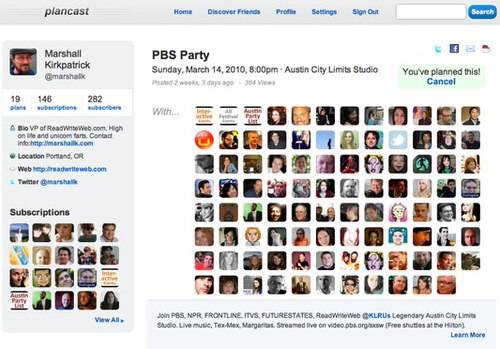Mark Hedrickson is 24 years old. He grew up in Menlo Park, California, down the street from Stanford, raised by a high-tech marketer Dad and a Mom in banking. Then he went to college and studied Nietzsche. He has now set out to build The Future – specifically your future, your intentions, your plans as a platform for analysis and software development.

The story became particularly interesting today: Hendrickson’s new company Plancast is submitting its much-anticipated iPhone app to Apple days before SXSW and announced on Hendrickson’s alma matter tech blog TechCrunch that it has raised just short of $1m from a list of industry stars. We offer below some perspective on what Plancast aims to do: nothing less than “to be the platform for all ‘intent’ data,” Mark Hendrickson says.
Plancast is a website where people post their plans. Plans to attend a conference, plans to go to a party, perhaps plans to get a haircut. “We have the same ‘who wants to share that?’ issue as Twitter,” Hendrickson told us today, “the standard ‘I dont use Twitter because i don’t care you’re eating a sandwich.’ What we’ve learned though is that semi-mundane stuff is actually interesting. So, perhaps we wont have a lot of the ‘getting a haircut’ stuff because that’s indeed quite mundane, but we will get ‘getting drinks tonight downtown’ or ‘heading to Palo Alto for the day’ type stuff. Which actually leads to very cool serendipity.”
Now that Twitter is such an unqualified success in all but monetization, it’s cool to say you’ve got the same problems Twitter had.
Mash up all those plans from friends and you get an interesting stream of forthcoming events.

The site is simple, if smart, today. The little company has big plans for the future, though. “We want to host and distribute all content that pertains to what individuals, organizations and businesses have planned for the future,” Hendrickson says. “If you break the idea of an ‘event’ down into its basic units (what’s going to happen, when, and where), there’s a ton of relevant social content through the long tail. We’re designed to host a superset of all this event data.”
Leveraging the Future
If the web first enabled people to publish diaries of their past actions, then moved on to status updates and check-ins about current thoughts and locations, then Plancast aims to be focused on the Future. “I think [the future has] been a neglected area in geo-location discussions,” Hendrickson says.
“Check-ins have dominated the conversation over the past year, and check-ins are great for what they are – but they have a certain limited value. If someone checks in somewhere across town, what are the chances you’re going to get up and hustle over there to join? You also have limited data — often you dont know why they’re there. From an advertiser’s point of view, you have to grab their attention immediately. Whereas if you have intent, you have more time to give them an offer and have them consider that offer and act on it. The scope of planning data is larger than check-in data in other ways too. Check-ins are really specific to particular venues — bars, retaurants, parks etc. so the scope of content/ads you can serve up is quite local.”
This conversation about the future needed to move on to something other than advertising.
“It’s absolutely a platform,” Hendrickson told us.
“It’s not just a consumer destination. We’re building our API early [expect to see it launch very soon] because we want to be the plumbing for future intent data. We want to power third party website calendar systems, third party apps, mash ups, etc. We want to do analysis on big data sets that compile intent data from all over. Once we start pulling from lots of sources — Facebook, Meetup, Linkedin, Twitter, Dopplr, Tripit, etc etc — we can then match intents and figure out really cool stuff. 50% more people are planning to see Avatar this weekend vs Hurt Locker. And we can pump this data back out to other companies that have special needs for it.
“Let’s say one day you can search ‘movies’ on Plancast and it knows A) your location, B) your past behavior, C) your friends’ activity, and D) aggregate activity. The top result could be a movie showing that 2 of your friends have already planned to see and which is very popular in aggregate in your city.”
Hendrickson says he’s hard at work building out privacy settings that will help more people feel more comfortable sharing more plans. That’s easier said than done, of course. This young, philosophically-trained startup co-founder from Palo Alto would be well-served by reaching out and bringing close to the company some advisors who specialize in understanding the privacy concerns of everyday people online, if he’s going to build a platform for the future of our communication around intent. Location based social networks in general face a big challenge in making people comfortable using them and demonstrating their utility before they can become mainstream phenomena.
For now Plancast is hiring engineers with its new money, which was just announced today. Investors include SoftTech VC, True Ventures, Founders Fund Angel, and Zelkova Ventures. Angels Aydin Senkut, Saul Klein, David Cohen, Joshua Schachter, Dave McClure, Dan Martell, Ron Bouganim and Paige Craig put in money as well, bringing the total to $800,000.
Things have come along quickly since Hendrickson was writing blog posts at TechCrunch, he left the staff there one year ago this Wednesday, and bought the domain Plancast.com for $500 last summer. (“I thought about buying Plancaster,” he says, “but some guy named Paul Lancaster had it.”)

Can this young man and his team build “the platform for all ‘intent’ data?” Marketing analyst Jeremiah Owyang has been bullish on Plancast for months. He described it as a leading example of the forthcoming “intention web” in December.
Expect the real-time web to quickly evolve into the intention web. People will work together to share their information about what they plan to do, and improve how they work or organize. Expect Social CRM systems (Salesforce, SAP), Brand Monitoring vendors (Radian6, Visible Technologies), and Search Engines (Bing and Google) to quickly try to make predictive models on what could happen, and what are the chances. Businesses that have a physical location like retail, events, or packaged goods can use this data to anticipate consumer demand. They may offer contextualized marketing, or increase or decrease inventory or store hours to accommodate. Don’t be surprised in the future and you walk into a store with your preferred items, meal, or drink already nicely packaged for you.
Plancast may or may not play a big role in transforming visions like that into reality, but it’s definitely a startup worth watching either way. Look for the company’s iPhone app later this week (built by high-profile developer Leah Culver) and check out the many listings of SXSW events on the site already, including our very own ReadWriteWeb event on Saturday night. We’d like to know if you plan on joining us.










